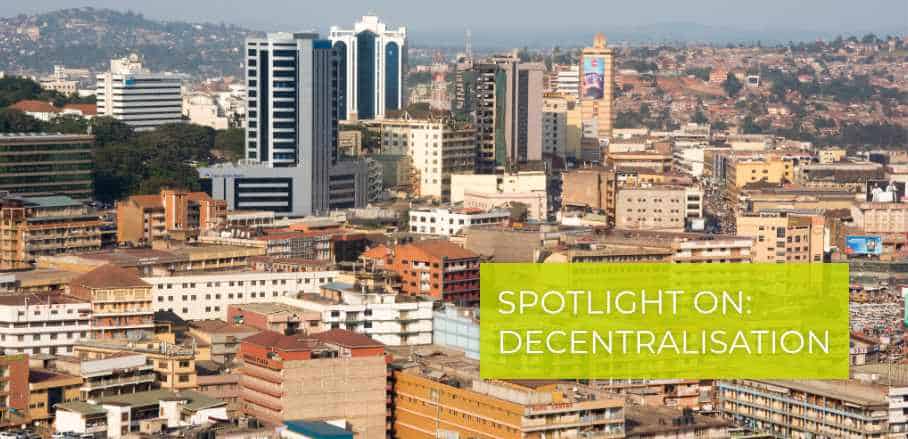Global Partnerships for City-Scale Challenges: the Karlsruhe-Kampala Climate Partnership
Evolving cross-border cooperation shows that trans-boundary action can help individual cities address local challenges. Emana Nsikan-George from Climate Alliance highlights the development of decentralised municipal cooperation and provides a promising example from Uganda and Germany.
Decentralised cooperation has become relevant in sustainable development efforts as national governments seek new partners and actors in addressing common global challenges of climate change, biodiversity, deforestation, and migration. The need for re-inventing new trans-boundary approaches that can help share the responsibility of environmental stewardship and minimise strain on already weak national budgets is crucial. For this reason, decentralisation in its non-formal, non-administrative and non-constitutional form, and across borders of sovereign nations, is becoming increasingly relevant.
Indeed, trans-boundary strategies have been adopted and well popularised between local authorities in the global south and global north – and in such trans-regional cooperations, it is especially municipal authorities that are the principal actors managing their cities’ development agenda.
The Emergence of a Non-formal and Decentralised Municipal Cooperation
Since the launch of the Global Covenant of Mayors for Energy and Climate, municipal authorities who are signatories to the covenant have improved their trans-boundary cooperation, especially with regards to climate and energy challenges. Furthermore, the emergence of new categories of actors, such as green energy providers, digital innovators, green investors, and other private sector agents, has underscored the need for greater solidarity and a strong sense of commitment between participating regions in a non-formalised way.
Non-formalisation implies however a non-binding commitment: the parties make no formal commitment to provide administrative or institutional resources for cooperation. Hence, there are neither legal obligations nor contractual agreements in such a partnership. In the event of a breach of terms, there is no legal system or window upon which to exercise rights. Thus, in the absence of legal and formalised systems of administration, the nature of non-formalised trans-boundary cooperation is rather based on moral commitment and a personal sense of responsibility.
In such configurations, mutual understanding between participating regions towards achieving knowledge-sharing, skills transfer, and competence building is imperative. However, to what degree can non-formalised, non-legal, and non-administrative systems contribute to solutions in different participating regions and countries? This requires a careful and deeper analysis of the value of such configurations, keeping in mind that countries and regions are constellations of unique political, economic, social and institutional formations. An indeed promising example of such a partnership is the Kampala-Karlsruhe Climate Partnership.
Strategic Alliances: the Kampala-Karlsruhe Climate Partnership
In 2019, the cities of Kampala, Uganda, and Karlsruhe, Germany engaged in a city-to-city climate partnership, consolidating their mutual interest in a meaningful municipal-owned partnership. The evolving climate partnership is indeed a veritable strategy for both Kampala and Karlsruhe, especially for harnessing new partners and promoting innovative solutions to local energy and climate challenges.
After Kenya, Uganda is becoming increasingly important for international engagement in sub-Saharan Africa. In terms of geopolitical configuration, Uganda is also strategic in the east African region with its leadership in regional renewable energy initiatives such as the East African Centre for Renewable Energy and Energy Efficiency (EACREEE), and other regional efforts to address land degradation and deforestation. Over the last decade, Uganda’s engagement with international development organisations and funding agencies has improved in scale, quality and depth.
However, Uganda is faced with a myriad of environmental challenges including climate change, deforestation, biodiversity loss, land degradation, urban floods, and urbanisation sprawl. Cities like Kampala are retooling their institutional systems to boost individual staff and departmental capacities to deal with these challenges. In this regard, the Kampala capital city authority, KCCA, having appraised the city’s potential and current gaps, has improved on its strategic development agenda and investment policy frameworks to encourage and facilitate the deployment of technological innovations in Kampala.
Karlsruhe, on the other hand, is known for its competitive advantage in innovation, science, and research as well as a hub for entrepreneurs. It has rather minimal credentials in global affairs and technical development cooperation and can thus benefit from the potential economic opportunities that might be associated with trans-boundary cooperation. The opportunity to transfer technology and innovation to Kampala would help build Karlsruhe’s international reputation as well as potentially strengthen their role in EU’s international policies on climate change and green energy solutions.
From Partnerships to Frameworks
However, operationalising the evolving non-formal climate partnership for its intended goals and exploit the mutual benefits, requires more than knowledge transfer, study trips, and the exchange of visits. It requires a new and flexible cooperation framework that allows the sustainable deployment and sharing of technologies including digital solutions in addressing domestic energy and transport challenges in Kampala.
A non-formalised, flexible, trans-boundary cooperation premised more on market-based technological sharing and green investment could not only be a sustainable and pragmatic approach to generate financial solutions – but a very strategic move to establish better diplomatic and technical cooperation ties. As the Karlsruhe -Kampala partnership evolves in the coming months and years, it remains to be seen how non-formal decentralisation and non-administrative cooperation can further meet climate challenges felt at the local level.
- Smart City: Is Africa Ready? Echoes from African Urban Slums - 12. November 2020
- Global Partnerships for City-Scale Challenges: the Karlsruhe-Kampala Climate Partnership - 18. August 2020
